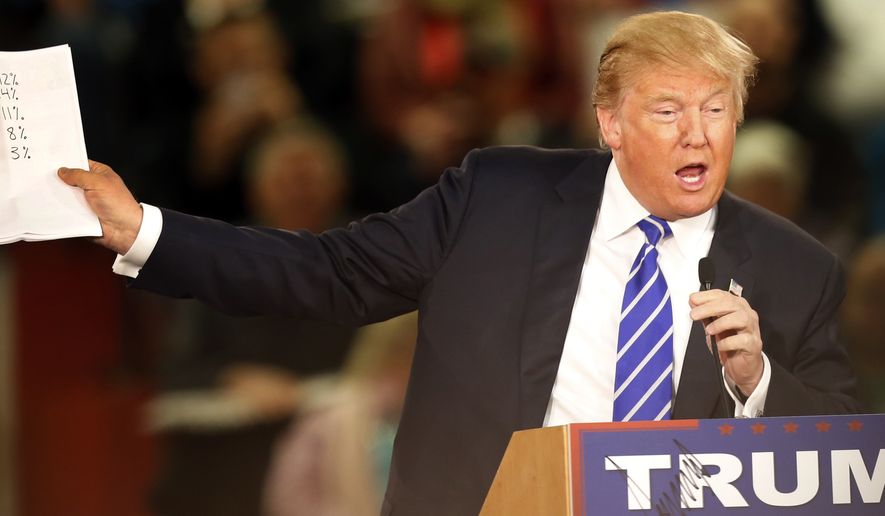Republican presidential contenders are proudly announcing their faith, quoting Scripture on the stump and cozying up to religious leaders Wednesday, as the battle heated up to win over evangelical voters who often are key to victory.
But front-runner Donald Trump continues to attract strong support among evangelical voters, who in most states make up half or more of the GOP primary electorate, without overtly trumpeting religious themes.
He has mentioned that he is a Protestant and raised questions about the evangelical standing of his closest rival, Sen. Ted Cruz of Texas. However, his success with the religious right has come more from bucking political correctness and railing against America’s decline, say experts.
Indeed, Mr. Trump had the highest level of support among white evangelical voters, 33 percent, in a recent NBC News/Survey Monkey poll of Republican voters nationwide.
Mr. Cruz, who has aggressively courted religious voters, had the second-highest level of support among white evangelical voters, 21 percent, followed by retired neurosurgeon Ben Carson at 12 percent and Sen. Marco Rubio of Florida at 10 percent.
The poll, which was conducted Dec. 28 through Jan. 3, found that, overall, Mr. Trump still enjoyed a commanding lead nationally at 35 percent. Mr. Cruz finished a distant second at 18 percent, followed by Mr. Rubio at 13 percent.
“It is very clear that he is acceptable to a lot of evangelicals,” said Tony Perkins, president of the Family Research Council, a Christian-based political advocacy group.
He credited Mr. Trump’s success with evangelicals to his brash disregard for political correctness.
“If you think across the country of a segment of the population that has been more throttled back by political correctness or targeted with political correctness, it’s evangelicals,” Mr. Perkins said.
Gary L. Bauer, chairman of the Campaign for Working Families political action committee, which is dedicated to electing conservative candidates, agreed.
“He has hit a nerve with large segments of the electorate who feel that the country is on a downward trajectory,” he said. “That concern crosses all sorts of lines, social lines, religious lines, etcetera. And he has done a very effective job giving voice to that, and I think it explains why he’s been a very formidable competitor for the last six months.”
He continued: “I would throw into that mix his full-throated war on political correctness is something that I think crosses a lot of these lines.”
Still, Mr. Cruz has won over many evangelical voters in Iowa, which helped catapult him into the lead ahead of the country’s first nominating contest in less than four weeks.
A Monmouth University poll last month showed Mr. Cruz with 30 percent of evangelical voters in Iowa, trailed by Mr. Trump at 18 percent, Mr. Rubio at 16 percent and Mr. Carson at 15 percent.
However, Mr. Trump’s support among evangelical voters in the Hawkeye State remained at the same level as in the same poll in October. Most of Mr. Cruz’s new evangelical support came at the expense of Mr. Carson, who has skidded dramatically among all voters in the polls.
A RealClearPolitics average of recent Iowa polls showed Mr. Cruz leading the race with 31 percent, followed by Mr. Trump at 27 percent, Mr. Rubio at 11 percent and Mr. Carson at 9 percent.
The rest of the candidates in the crowded GOP field finished in the low single digits, according to the polling average.
Mr. Cruz hammered religious themes as he crisscrossed Iowa this week on a bus tour.
At a Christian bookstore in Boone, Iowa, he quoted from the Old Testament book by the prophet Joshua.
“I was seeing Joshua 24:15 on the wall: ’choose you this day whom you will serve; as for me and my house, we will serve the Lord,’” he said. “And what a powerful reminder of the values that Washington, D.C., seems to have forgotten. What a powerful reminder of the values that built this country.”
Meanwhile, Mr. Rubio announced the formation of his campaign’s Religious Liberty Advisory Board, which is made up of prominent pastors, advocates and religious scholars.
“Marco is a leader of faith who understands that our country was rooted in the principle of religious liberty. As he strives to uphold this founding principle, he seeks guidance from faith leaders across the country who are dedicated to defending it,” the campaign said in a statement.
Mr. Carson, whose Seventh-day Adventist religion has been a hallmark of his run, will be campaigning with best-selling evangelical author John Maxwell next week in Iowa.
• S.A. Miller can be reached at smiller@washingtontimes.com.




Please read our comment policy before commenting.